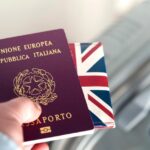In today’s globalized world, a passport is an essential travel document that grants you access to countries around the world. Whether you are planning a vacation or a business trip, having a valid passport is crucial.
If you have been considering traveling to Italy, you may be wondering: do you need a passport to travel to Italy? In this article, we will explore the importance of passports for international travel and delve into the specific passport requirements for traveling to Italy.
Before we dive into the details of traveling to Italy, let’s take a moment to understand what exactly a passport is. A passport is an official government-issued document that verifies your identity and citizenship.
It serves as your key to enter foreign countries and acts as proof that you have been granted permission by your own country to leave and re-enter its borders. Additionally, passports contain important information such as your full name, date of birth, and photograph.
Now that we have established the significance of having a valid passport for international travel, let’s focus on the specific requirements for traveling to Italy. Italy has its own set of regulations when it comes to passports and visas.
In this article, we will discuss what types of passports are applicable for traveling to Italy, any additional visa requirements that may be necessary, how to obtain a passport if you don’t already have one, and what steps you should take in case your passport gets lost or stolen during your trip.
So if you’re considering a trip to Italy, keep reading our comprehensive guide below to ensure that you have all the necessary information regarding passports and their requirements before embarking on your journey.
What is a passport
A passport is an official government-issued document that serves as proof of a person’s identity and citizenship. It allows individuals to travel internationally and serves as a crucial identification document in foreign countries. In the case of traveling to Italy, a passport is an absolute necessity.
A passport contains important information about the holder, including their full name, date of birth, place of birth, nationality, and a photograph. Additionally, it includes biographical information such as height, eye color, and signature. All this information is essential for immigration control and ensuring the security of cross-border travel.
Passports are generally issued by the government of a person’s home country and must be valid for international travel. When traveling to Italy or any other foreign country, it is crucial to have a valid passport that will not expire before the end of your trip. The expiration date on your passport should be carefully checked well in advance to ensure you have enough time for both planning your trip and renewing your passport if necessary.
| Passport Information | Description |
|---|---|
| Definition | An official government-issued document that serves as proof of identity and citizenship |
| Purpose | Allows individuals to travel internationally and serves as identification in foreign countries |
| Information Contained | Full name, date of birth, place of birth, nationality, photograph, height, eye color. |
When traveling to Italy specifically, there are certain requirements regarding passports that need to be met. Regular passports are typically accepted for entry into Italy. However, travelers with different types of passports such as diplomatic or emergency passports must check with the Italian embassy or consulate in their home country for specific requirements.
In addition to having a valid passport, travelers to Italy may also need to apply for a visa depending on their nationality. The specific visa requirements vary based on citizenship and the duration and purpose of the trip. It is important to research and understand these requirements well in advance of your travel dates, as obtaining a visa can sometimes be a lengthy process.
Overall, it is crucial to have a valid passport when traveling to Italy. Without it, you will not be permitted entry into the country. Additionally, having an up-to-date passport is essential for a smooth travel experience and avoiding any potential problems or delays at immigration checkpoints. Ensuring that you have all the necessary documentation, including a valid passport, is one of the most important steps in planning your trip to Italy.
Passport requirements for Italy
When planning a trip to Italy, it is important to understand the passport requirements in order to ensure a smooth travel experience. A passport is a vital document that serves as proof of identity and citizenship when traveling internationally. It is required by all travelers, regardless of age, entering or exiting Italy.
To enter Italy, visitors must have a valid passport that remains valid for at least three months beyond the intended date of departure. This requirement applies to all travelers, including those from visa-exempt countries. For example, if your planned stay in Italy is for two weeks, your passport should be valid for at least three and a half months from the date of arrival.
An important thing to consider when traveling to Italy is that some countries have specific visa requirements in addition to passport requirements. It is crucial to check the entry visa requirements for your specific country of citizenship before embarking on your journey. The Schengen Agreement plays an important role in this aspect as well. The agreement allows citizens from certain countries, such as those within the European Union (EU), to travel within the Schengen Area without needing an additional visa.
In summary, having a valid passport with sufficient validity is essential when traveling to Italy. It is crucial to ensure that your passport meets the necessary requirements outlined by Italian authorities. By being well-prepared and knowledgeable about these requirements, you can avoid any potential issues or delays during your trip.
| Passport Requirements | Details |
|---|---|
| Valid Passport | Your passport must remain valid for at least three months beyond your intended date of departure from Italy. |
| Visa Requirements | If you are not exempt from obtaining a visa when traveling to Italy, it is crucial to fulfill all additional visa requirements based on your country of citizenship. |
| Schengen Agreement | Citizens from certain countries, including EU member states, can travel within the Schengen Area without needing an additional visa. However, passport validity requirements still apply. |
How to obtain a passport
To travel internationally, including to Italy, a valid passport is required. If you don’t have a passport yet or need to renew your current one, it’s important to know the process and requirements for obtaining a passport. Here is a step-by-step guide on how to obtain a passport:
- Determine the type of passport you need: There are different types of passports depending on your needs. The most common type is the regular passport, which is used for general international travel. However, there are also diplomatic passports for government officials and emergency passports for urgent travel situations.
- Gather the necessary documents: To apply for a passport, you will need certain documents such as proof of citizenship (birth certificate or naturalization certificate), proof of identity (driver’s license or government-issued ID), and passport photos. Make sure to check with your local passport office or embassy for specific requirements.
- Complete the application forms: Fill out the appropriate application form, which can usually be done online or by requesting a physical form from your local passport office. Provide accurate and up-to-date information on the form and double-check for any errors before submitting it.
- Submit your application: Once you have completed the application forms and gathered all the necessary documents, submit them to your local passport office or embassy along with any applicable fees. Depending on your location, you may need to make an appointment or mail in your application.
- Provide passport photos: Your application will require recent passport-sized photos that meet specific criteria regarding size, background color, and appearance. Make sure to follow these guidelines closely to avoid any delays in processing your application.
- Pay the required fees: Passport applications typically involve fees for processing and expedited services if needed. Be prepared to pay these fees when submitting your application.
- Wait for processing: After submitting your application, it will take some time for it to be processed and for your new passport to be issued. Processing times may vary, so it’s important to apply well in advance of your planned travel date.
Expediting the passport application process: If you have urgent travel plans or need your passport sooner, there are options available for expediting the processing time. These services usually require an additional fee and may be subject to certain eligibility criteria. Contact your local passport office or embassy for more information on expediting your passport application.
Having a valid passport is essential for international travel, including traveling to Italy. By following these steps and ensuring you meet all the requirements, you can obtain a passport and be ready for your Italian adventure. Remember to apply early and keep your passport secure throughout your travels.
Passport validity and expiration
When planning a trip to Italy, it is essential to understand the passport validity and expiration requirements. The Italian government requires that your passport be valid for at least three months beyond your planned departure date from Italy. This means that if you are planning to stay in Italy for a week, your passport must be valid for at least three months after that week ends.
To ensure compliance with Italian regulations, it is crucial to verify the expiration date on your passport well in advance of your trip. If your passport is nearing its expiration date or has already expired, you will need to renew it before traveling to Italy. It typically takes 4-6 weeks to process a passport renewal application, so it is advisable to plan accordingly.
Traveling with an expired passport can result in being denied entry into Italy or even being sent back home upon arrival. Airlines are responsible for verifying passengers’ travel documents before allowing them to board their flights, so if your passport has passed its expiry date, you may not even be able to begin your journey. It is vital to avoid any potential disruptions by ensuring that your passport has ample validity remaining before embarking on your trip.
In addition to the three-month validity requirement, it is worth noting that some airlines have stricter policies regarding passport expiration dates. Some carriers may require six months’ validity instead of the three months mandated by Italian regulations.
To avoid any complications during check-in, it is advisable to contact both the airline operating your flight and the nearest Italian consulate or embassy well in advance. They will provide you with updated and accurate information regarding passport requirements specific to your situation.
Ensuring that your passport is valid and meets all necessary requirements is crucial when planning a trip to Italy. By being informed about these regulations and taking proactive steps towards maintaining a valid passport, you can guarantee smooth entry into the country and focus on making lifelong memories during your visit. Remember, an up-to-date passport is your ticket to the world.
Passport alternatives for certain travelers
Traveling with Dual Citizenship or Residency in the EU
For travelers who hold dual citizenship or residency in the European Union (EU), there may be passport alternatives when traveling to Italy. The EU has implemented the Schengen Agreement, a treaty that allows for borderless travel between participating countries. This means that if you are a citizen of an EU member state and hold a valid national ID card, you may not need a passport to enter Italy.
It is important to note, however, that not all EU member states have fully implemented the Schengen Agreement, and some still require the use of passports for entry into Italy. Therefore, it is essential for travelers with dual citizenship or residency in the EU to check the specific requirements of their home country and obtain the necessary travel documents accordingly.
Additionally, it is advisable to carry both your passport and your national ID card while traveling to ensure smooth entry and exit from Italy.
Passport Options for Non-EU Citizens Residing in the EU
Non-EU citizens who reside in an EU member state typically require a valid passport when traveling to Italy. However, depending on their country of residence, they may be eligible for certain passport alternatives. Some countries have agreements with Italy that allow their residents to travel using alternative travel documents.
For example, if you are a resident of Switzerland, Liechtenstein, San Marino, Vatican City, Monaco, or Andorra and do not hold an EU passport, you may be able to enter Italy with a national identity card issued by your country of residence. However, it is crucial to verify this information with the Italian Embassy or Consulate in your country of residence prior to traveling.
The Importance of Verifying Passport Requirements
Regardless of any potential passport alternatives mentioned above, it is crucial that travelers thoroughly research and verify the specific requirements for entering Italy based on their nationality and residency status. Passport regulations may change periodically, so it is important to stay up to date with any changes and ensure compliance with the current rules.
If you are unsure whether you need a passport or if there are any alternatives available to you, it is highly recommended to consult with the relevant embassy or consulate for accurate and up-to-date information. The officials at these institutions will be able to guide you on the necessary travel documents required for your trip to Italy, ensuring a smooth and hassle-free experience.
Importance of keeping your passport safe
Tips for protecting your passport while traveling in Italy
When traveling to Italy, it is crucial to keep your passport safe and secure at all times. Your passport acts as your primary identification document in a foreign country, and losing it can lead to numerous complications and hassles. Here are some tips for keeping your passport safe while exploring the beautiful country of Italy:
1. Use a secure money belt or pouch: Invest in a reliable money belt or travel pouch that can be worn discreetly under your clothing. This will minimize the chances of someone grabbing or pickpocketing your passport.
2. Keep electronic copies: Before embarking on your trip, make sure to take photos or scan copies of your passport’s information page and keep them securely stored in an online cloud storage system. In case you lose your physical passport, having electronic copies will help with obtaining a replacement more easily.
3. Avoid leaving passports unattended: Whether you’re staying at a hotel, hostel, or any other accommodation, be mindful never to leave your passport unattended in your room or any common areas.
4. Consider using hotel safes: If available, use the hotel’s safety deposit box or room safe to store your passport when you’re not carrying it with you.
5. Beware of common scams: Be aware of popular tourist scams such as distraction techniques used by pickpockets. These scammers may approach you asking for help or intentionally create distractions so they can grab your belongings.
Potential risks and consequences of losing your passport abroad
Losing your passport while traveling in Italy can lead to various risks and consequences that can disrupt and delay your trip. These include:
1. Inability to identify yourself: Without a valid passport, you may face difficulties proving your identity to local authorities or when dealing with transportation companies, hotels, or rental car agencies. This can result in denied entry or delayed travel.
2. Difficulty returning home: If you lose your passport near the end of your trip, you may encounter obstacles while trying to board your flight back home. Airlines require a valid passport for international travel, and without it, you may be unable to return on your scheduled departure date.
3. Financial and administrative burdens: Replacing a lost passport can be expensive and time-consuming. You will likely need to visit the nearest embassy or consulate of your home country in Italy, fill out forms, submit additional documents, pay fees, and potentially wait for a significant amount of time before receiving a new passport.
4. Potential for identity theft: Losing your passport also puts you at risk of identity theft. Criminals could use the personal information found in your lost passport to commit fraud or engage in other illicit activities.
It is crucial to take precautions to avoid losing your passport while traveling in Italy, but if you do find yourself in this unfortunate situation, here are the steps you should take:
1. Report the loss or theft immediately: Contact the local police authorities and file a report. This will be necessary when applying for a replacement passport.
2. Contact your embassy or consulate: Get in touch with the nearest embassy or consulate of your home country as soon as possible. They will guide you through the process of obtaining an emergency travel document or temporary passport.
3. Follow embassy instructions: The embassy staff will provide specific instructions on what documents are required and where to go for an interview and photo capture session to expedite the replacement process.
By taking cautionary measures and being well-informed about what actions to take if your passport is lost or stolen, you can minimize the risks and inconveniences associated with such an unfortunate event.
Conclusion
In conclusion, having a valid passport is essential for traveling to Italy. As discussed throughout this article, a passport serves as proof of identity and citizenship, allowing you to enter and exit foreign countries. When it comes to traveling specifically to Italy, there are certain requirements that must be met in order to enter the country. These requirements include having a valid passport with sufficient validity remaining, along with any necessary visas.
It is important for travelers to understand the process of obtaining a passport if they do not already have one. This includes gathering the necessary documents, filling out forms, and submitting photos. Additionally, expediting options may be available for those who need their passports in a hurry. It is crucial to apply well in advance of your planned trip to avoid any last-minute hassles or delays.
Once you have obtained your passport, it is important to keep it safe while traveling in Italy. Losing your passport can result in significant challenges and inconveniences. Therefore, it is recommended to store your passport securely and take precautions such as making copies of important documents and keeping them separate from the original.
Frequently Asked Questions
Can you visit Italy without a passport?
No, you cannot visit Italy without a passport. A passport is an essential travel document that allows you to enter foreign countries. It serves as official identification and proves your citizenship. When traveling to Italy or any international destination, having a valid passport is mandatory.
Can you travel from the US to Italy without a passport?
No, you cannot travel from the US to Italy without a passport. Just like any other international travel, a valid passport is required for American citizens visiting Italy. The passport must be valid for at least six months beyond the planned departure date from Italy, so it’s crucial to check its expiration date before planning your trip.
What documents do I need to visit Italy?
When visiting Italy, whether as a tourist or for another purpose, there are specific documents you will need in addition to your passport. Firstly, check if your country of residence requires a visa for entry into Italy; citizens of some countries are visa-exempt or can obtain a visa on arrival while others need to apply in advance. Additionally, it is recommended to carry proof of accommodation arrangements such as hotel bookings, an itinerary of your trip, and evidence of sufficient financial means to cover your stay in Italy (e.g., bank statements).
It’s also advisable to have travel insurance that provides adequate coverage during your trip. Lastly, it’s essential to familiarize yourself with the current entry requirements and travel advisories provided by the Italian government or your own country’s embassy before departing for Italy.

I’m a passionate traveler, writer, and Italophile. My fascination with Italy’s history, art, and culture has led me on countless adventures across the Italian landscape. Through “I Live Italy,” I share my love for this extraordinary country and aims to inspire others to explore its boundless beauty.





